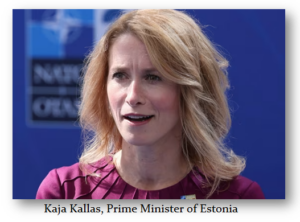Navigating the Complexity: EU Trade Relations and the Israel-Palestine Conflict

As tensions escalate in Gaza, the political landscape within the EU is changing rapidly. Recently, the Netherlands has called for a review of its trade agreements with Israel, questioning the nation’s commitment to human rights as mandated in Article 2 of the EU-Israel association agreement. Dutch Foreign Minister Caspar Veldkamp highlights concerns over Israel’s actions that, according to him, violate these essential principles.
Human Rights at the Forefront
In a poignant letter to Estonian Prime Minister Kaja Kallas, Veldkamp strongly condemned the denial of humanitarian aid to Gaza since March 18. “You cannot starve the people of the Gaza Strip. It’s against international law. It’s morally wrong. It’s dangerous,” he wrote, emphasizing the need for Israel to adhere to international humanitarian standards. This raises a critical question: How do democratic nations reconcile their military actions with their moral obligations?
Veldkamp further stated that the chances of a ceasefire appear “very slim,” and he is skeptical about Hamas adhering to humanitarian law. Yet, his real concern lies with Israel. As he articulately put it, democracies ought to engage differently in conflicts, suggesting that Israel must demonstrate its commitment to humanitarian principles, despite provocative statements from its ministers.
European Stance on Palestinian Rights
In her earlier remarks, Kaja Kallas reiterated the EU’s support for the Palestinian Authority and expressed a desire for the return of displaced Palestinians. “Palestinians must be able to live in Gaza. At the same time, Gaza must never again be a terror haven,” she asserted. This poses a significant balancing act for the EU, caught between its obligations to uphold human rights and political pressures within the union.

The Complex Landscape of International Alliances
The geopolitical tension doesn’t stop at the Israel-Palestine conflict. Israel’s stance in the ongoing Ukraine war reflects its complicated international relationships. Despite a nuanced position, Israel has been accused of siding with Russia after voting against a UN resolution reaffirming Ukraine’s territorial integrity. This offers a unique perspective on how the conflict in the Middle East interlaces with broader global issues.
Kallas has even gone so far as to criticize former President Donald Trump for aligning himself with Putin. For some EU leaders, Trump’s policies seem to obstruct a more unified approach towards confronting global threats, particularly the Russian aggression.
Divergent Opinions within the EU
The EU stands divided on its approach to the Israel-Palestine conflict. Nations like Spain and Ireland have voiced criticisms of Israel’s military actions, while Hungary and Germany maintain strong support. This discord demonstrates a precarious balancing act for the EU, especially as it finds itself thrust into the complex interplay of Middle Eastern politics while focusing on Russia’s aggression.
A joint statement from EU foreign policy leaders has reiterated that “Israel is obliged under international law to ensure that humanitarian aid reaches the population in need.” This insistence reflects the evolving nature of trade dynamics influenced by human rights considerations.
Economic Implications
As the EU’s largest trading partner, Israel plays a crucial role in Europe’s economic landscape. The EU-Israel Association Agreement established free trade that totaled roughly $28.6 billion in exports to Israel and $17 billion in imports in 2024. With mounting political pressures, the EU is now faced with leveraging its economic power to influence Israel’s policies and actions.
What Lies Ahead?
Tensions are mounting, and the strategic meeting between Trump and Israeli leadership could lead to significant shifts in military engagement as well as policy direction in Gaza. The EU sits at a crossroads and has a unique opportunity to influence both the United States and Israel. Major events are anticipated this May, and how they unfold could set the tone for both regional and international relations for years to come.
At Extreme Investor Network, we’ll continue to monitor these developments closely, analyzing their implications on trade, economics, and global stability. Stay tuned for more insights as we navigate these turbulent waters together.

